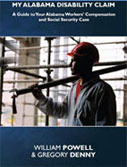Alabama’s Statute of Limitations Explained
If you suffered a workplace injury in Alabama, to have a compensable workers’ compensation claim, several hurdles have to be cleared: (1) the injured worker must actually be an employee of the defendant; (2) your employer must be subject to Alabama’s workers’ compensation laws; (3) you must show that (i) you suffered a workplace injury; (ii) while performing your job duties for your employer; (4) the injured worker has an obligation to inform his employer that he has suffered a workplace injury and (5) the injured worker has to show that the injury they are complaining from was the result of the job accident they suffered. If this can be shown, then you have a valid Alabama Workmen’s Compensation claim, but that doesn’t mean anything if you allow your statute of limitations to expire.
The Statute of Limitations is the statutorily prescribed limitation on a person’s right to bring a legal action. For an Alabama Workmen’s Compensation claim, the statute of limitation in relation to a workplace injury is 2 years from the date of your job injury, or two years from the date you last received temporary total disability benefits, whichever date is latest. If your workmen’s compensation claim has not been settled by this date, or a verified lawsuit filed by this time, then your right to compensation for your Alabama Workmans Compensation claim is forever waived; however, in certain instances the statute of limitation can be tolled to allow suit to be brought at a later time (eg. if your employer misled you into believing you had longer to bring suit, your injury was latent for some time or if instead of ttd benefits your employer paid you your full salary for less than full work).
Having stated this, the statute of limitations may be tolled in certain circumstances. One such instance is when, instead of having you off work drawing ttd benefits, your employer chooses to pay you your full wage despite the fact you are unable to perform all your job duties. If you have suffered a workplace injury which your employer is aware of, you have job limitations which your employer knows about and you are being paid your full wages while being unable to perform all your job duties, then these payments may be sufficient to toll your statute of limitations in the same way payment of ttd benefits would. Having stated this, it is best not to assume your paycheck will toll your statute of limitations.
The Statute of Limitations in your Alabama Workmans Compensation claim may also be tolled if you suffer from a latent injury. A latent injury is one which occurs over a period of time and whose symptoms also take time to develop. For latent injuries, such as the brain injury claim being made by Kellen Winslow in the attached article, the statute of limitations does not start to run until a “reasonable person” would have recognized the nature and seriousness of their job injury.
The last instance we will discuss about tolling the statute of limitations deals with the instance where your employer, or more likely the workers compensation insurance carrier, intentionally misleads you into believing that your statute of limitations will not expire within 2 years of your workplace injury or 2 years from the date you last received ttd benefits. You will need some proof that your employer or the adjuster handling your workers compensation claim misled you. The fact no one told you about the statute of limitations is not sufficient to toll your statute as no one has the obligation to tell you what the law is in Alabama. 2 years ago we dealt with this specific issue in a lawsuit in Jackson County, Alabama, and we were able to show that the insurance adjuster intentionally told our client that they did not have to worry about their statute expiring and they promised they would “take care of them.” Later when the insurance carrier tried to argue that they did not owe the injured worker anything, the injured worker hired Powell and Denny and we were able to prove to the Court that the insurance carrier had intentionally mislead our client and were able to help them receive all the benefits-both monetary and medical-they were legally entitled to receive.
If you live anywhere in Alabama, you have suffered a workplace injury and have questions about whether you have a compensable workers comp claim, you should not hesitate to speak with an Alabama Workmen’s Compensation Lawyer. The experienced Alabama Workmen’s Compensation attorneys at Powell and Denny would be happy to discuss your Alabama Workmen’s Compensation claim with you.
Powell and Denny: We Work When You Can’t.
Offices in Birmingham, Alabama and Huntsville, AL
Alabama Workers Compensation Attorneys
Birmingham Workers’ Compensation Lawyers
Huntsville Workers’ Compensation Attorneys
Powell and Denny have been selected as one of the Best Law Firms by U.S. News and World Report for each of the last 6 years, have been selected as one of Birmingham’s Top Lawyers by B-Metro Magazine for the last 3 years, have been selected by The National Advocates as one of the Top 20 Workers’ Compensation Firms (plaintiffs) and Powell and Denny, P.C.-has been selected as one of the “Best of the Best” law firms by The American Registry.
Mr. Denny AV rated by Martindale Hubbard (the highest rating possible) and Mr. Powell has been rated as Superior by The National Registry
Alabama’s Statute of Limitations Explained




